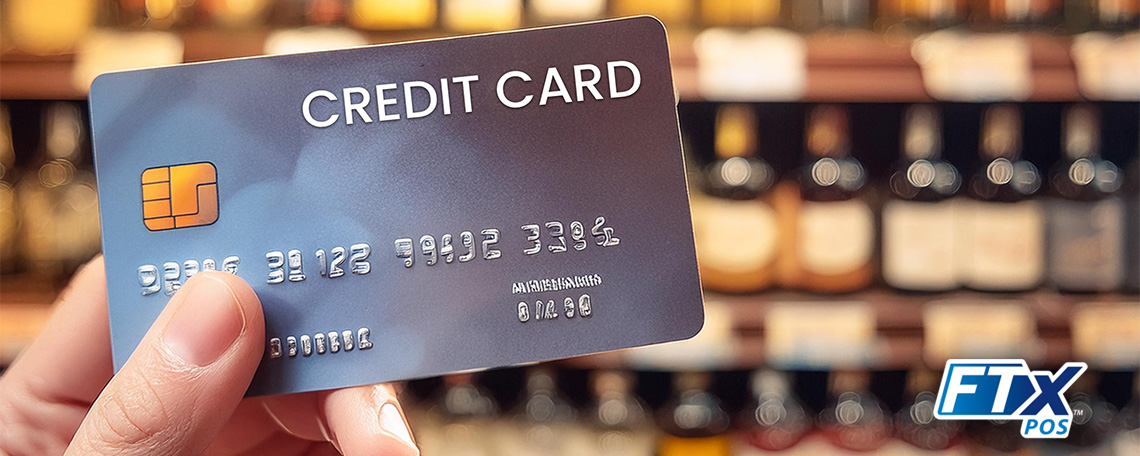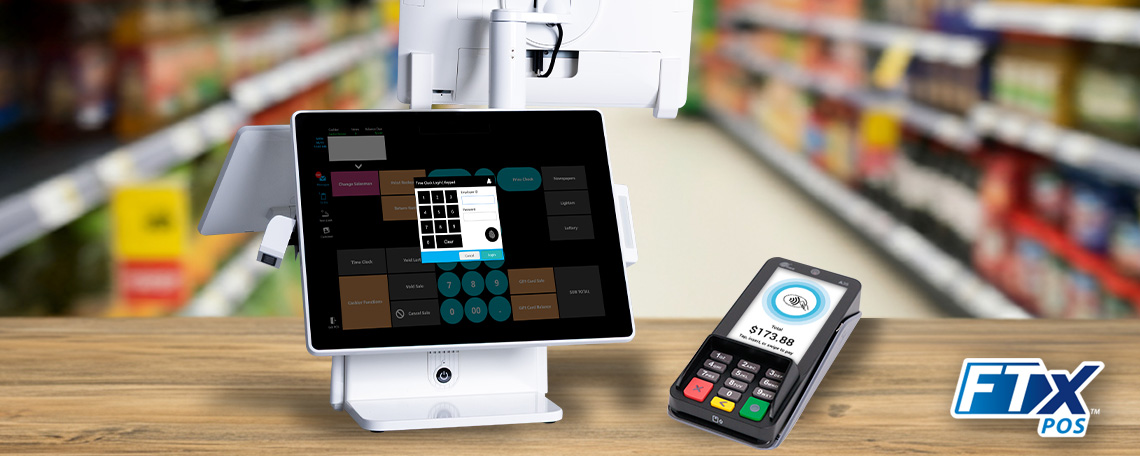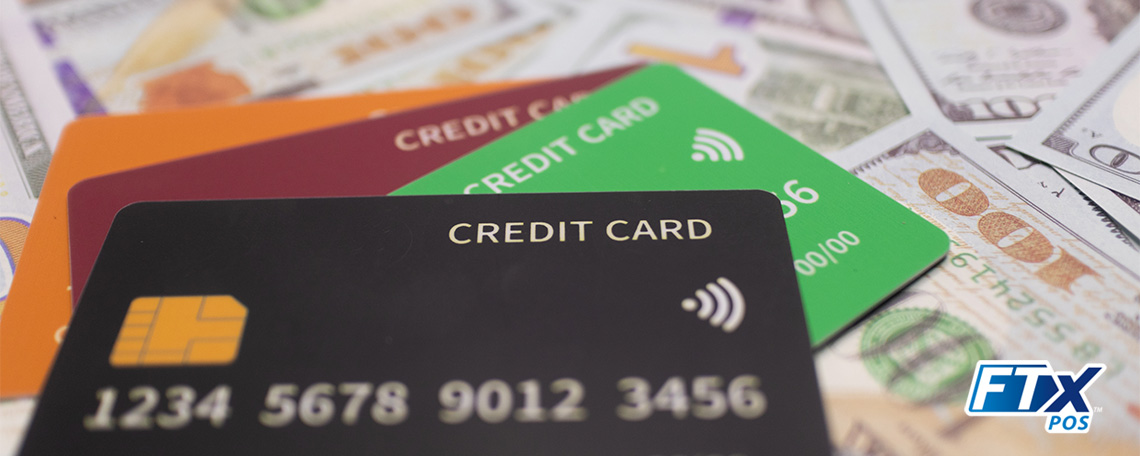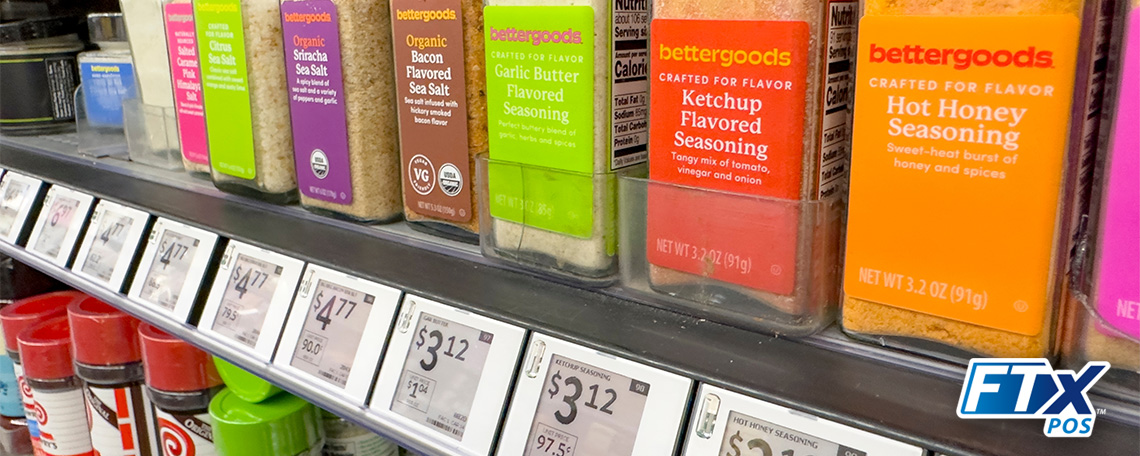Running a liquor store isn’t easy. Between managing inventory, preventing underage sales, and staying competitive, there’s a lot on your plate.
Payment processing is one area that can quickly affect your bottom line. Impulse credit card processing and high fees can eat into profits, while in-store payment processing issues – like chargebacks, slow checkouts, or clunky integrations – frustrate both you and your customers.
The good news? The right payment processor can make all the difference. A reliable solution keeps you compliant with liquor laws, speeds up transactions, protects customer data, and gives you insights to run your business more efficiently.
In this guide, we’ll break down why credit card processing matters for liquor stores, what makes the industry high-risk, and how choosing the right system can help boost sales while keeping operations smooth.

What Is Liquor POS Credit Card Processing?
Running a liquor store comes with unique challenges – especially when it comes to payments. Liquor POS credit card processing is a specialized system that combines a point-of-sale (POS) system with credit card processing for liquor stores, allowing you to securely and efficiently handle transactions while staying compliant with industry regulations.
How It Works
1. Integrated Payment Processing – A credit card reader for liquor stores connects to your POS system, enabling seamless swipes, dips, and taps for debit/credit cards, mobile wallets, and more.
2. High-Risk Merchant Account – Since liquor stores are classified as high-risk, you’ll need an alcohol merchant account tailored to handle higher chargeback risks and stricter underwriting.
Related Read: The Complete Guide on Merchant Services Providers
3. Real-Time Authorization – Transactions are processed instantly, reducing delays and ensuring smooth alcohol payment processing.
4. Dual Pricing Strategies – Some systems support cash vs. credit pricing to offset processing fees – a smart cash flow solution for liquor stores.
Why It’s Essential for Liquor Stores
- Faster Checkouts – A streamlined liquor store credit card processing system keeps lines moving.
- Better Security – Payment Card Industry (PCI)-compliant systems reduce fraud risks, crucial for liquor store security.
- Inventory & Sales Tracking – POS integration for liquor stores syncs payments with stock levels, helping you manage supply and demand.
- Age Verification Compliance – The built-in ID scanning feature verifies the customer’s age instantly and keeps your business compliant with liquor laws.
- Seamless Multi-Payment Options – It accepts debit/credit cards, digital wallets, and contactless payments, giving customers flexibility at checkout.
- Reduces Human Errors – It automates the data entry process, and real-time syncing reduces human errors in billing, pricing, and inventory tracking.
- Low Operational Costs – Efficient transactions and accurate reports save a lot of time and reduce labor costs, which improves overall profitability.
- Scalability for Growth – With store expansion, the system can handle more transactions, inventory, and multiple locations.
- Improves Customer Experience – Faster checkouts, accurate billing, and multiple payment options offer a hassle-free shopping experience, which keeps customers coming back.

Whether you’re upgrading your current system or exploring credit card processing for liquor stores for the first time, choosing the right liquor POS credit card processing solution can boost efficiency, reduce risks, and even improve liquor store financing options.
What Is High-Risk Liquor Store Payment Processing?
Running a liquor store is already challenging, and being labeled as high-risk by payment processors adds to the difficulty. But what does being high-risk mean? It means your business has a higher chance of chargebacks and fraud, making payment processors cautious.
While this label might seem like a burden, it also offers benefits like specialized services tailored to your needs.
Specialized Services
They provide custom solutions specifically designed for high-risk businesses, ensuring they have the tools and support needed to thrive in a challenging environment.
Dedicated Support
The customer support teams of specialized services are highly knowledgeable in high-risk industries, offering expert guidance and assistance tailored to the unique needs of these businesses.
Advanced Fraud Protection
They employ strong security measures to prevent fraud and chargebacks, safeguarding your business with cutting-edge technology and proactive monitoring.
Liquor Store Payment Gateway vs. Payment Processor
A payment gateway and a payment processor might sound similar, but they’re quite different. A payment gateway is the technology that captures and transfers payment data from the customer to the payment processor.
On the other hand, the payment processor is the company that handles the transaction, ensuring the funds move from the customer’s bank to your merchant account.
In-Store Payments
For in-store purchases, the payment gateway works with point-of-sale (POS) systems to process transactions seamlessly.
Online Payments
When selling online, the payment gateway securely handles customer information and processes the payment.
FTx POS provides integrated payment processing solutions tailored for liquor store retailers. Our system ensures seamless, secure, and fast transactions, helping store owners deliver a smooth checkout experience for customers.
A Liquor Store Payment Processor: Why Is It Necessary?
Liquor stores require specialized credit card processing due to their high-risk status, which is often attributed to age restrictions, regulatory compliance, and higher potential for chargebacks.
This type of processing differs from traditional retail in several ways:
Specialized Services
High-risk payment processors offer services tailored to mitigate the risks involved in selling alcohol. These services include chargeback protection, compliance assistance, and specialized customer support.
Higher Security Measures
Security is paramount when dealing with high-risk transactions. High-risk processors implement additional security measures to protect your business from fraud and chargebacks.
Flexible Solutions
High-risk payment processors often provide more flexible solutions, including faster payout cycles and customized rates based on your business needs.
Do You Need a Liquor Store Merchant Account?
An merchant account is a type of bank account that allows businesses to accept credit card payments, facilitating smoother transactions and expanding payment options for customers. While some payment processors require businesses to have a merchant account, others do not.
However, having a merchant account can offer additional benefits like faster payouts, better fraud protection, and detailed transaction records. These features can be crucial for maintaining cash flow and ensuring secure operations.
Related Read: Best Credit Card Processing for Small Businesses – A Complete Guide
Why Traditional Processors Can Leave Your Liquor Store High and Dry
Let’s face it, traditional credit card processors just aren’t built for the realities of running a liquor store. You need a partner who understands your industry, not one that throws unexpected roadblocks your way.
Here’s how traditional processors can cause headaches for your business:
Sudden Shutdowns
Traditional processors can unexpectedly terminate your account, leaving you without a way to accept credit cards and scrambling to find a new solution. This can disrupt your sales and frustrate your customers.
Cash Flow Freeze
They might hold your hard-earned funds for extended periods due to vague compliance reasons. This can tie up your cash flow and make it difficult to manage your business operations.
Specialized Needs, Ignored
Traditional processors may not have the experience or support system to address the specific challenges faced by liquor stores. This can leave you feeling lost and frustrated when you need help.
Get Started. Choose a liquor store POS system with integrated payment processing or use our third-party processing solutions. We will meet – or beat – your current card processing rates.
High-Risk Liquor Store Payment Processing: What to Expect
Running a liquor store involves unique considerations, and payment processing is no exception.

Here’s what to expect:
- Transaction Fees: Payment processing fees for liquor stores might be higher than for other businesses due to the industry’s specific risk factors.
- Reserve Accounts: Some processors might require a reserve account to safeguard against potential chargebacks. This account holds a portion of your sales for a set period.
- Payout Schedules: Payouts from processed transactions might occur less frequently, often weekly or biweekly, compared to daily settlements in other industries.
- Application Scrutiny: Liquor store applications might undergo a more thorough review due to industry regulations and potential fraud risks.
- Chargeback Management: Processors might have stricter thresholds for acceptable chargebacks. Exceeding these limits could lead to account termination or penalties.
Impact of Credit Card Processing Speed on Liquor Store Sales
In a fast-paced retail environment like a liquor store, every second counts. Slow transactions frustrate customers, while speedy checkouts keep lines moving and encourage repeat business.
Below, we break down the impact of credit card processing speed on liquor store sales – and why upgrading your system could be a game-changer:
1. Faster Checkouts Lead to Higher Customer Satisfaction
Nobody likes waiting in line – especially when they just want to grab their favorite drink and go. A fast and reliable credit card reader for liquor stores ensures smooth transactions, reducing wait times and keeping customers happy.
Hassle-free checkouts improve customer retention and encourage positive reviews. Since liquor purchases are often time-sensitive (think last-minute party runs), a speedy alcohol payment processing system can turn first-time buyers into loyal patrons.
2. Slow Processing Causes Long Lines and Abandoned Sales
When card transactions lag, frustration builds – and so do abandoned carts.

Long lines caused by sluggish liquor store credit card processing can lead to:
- Lost sales – Customers may leave without purchasing.
- Negative reviews – Slow service is a top complaint for retail businesses.
- Missed peak-hour revenue – Slower processing means fewer transactions during rush times.
Investing in a high-speed POS integration for liquor stores minimizes these risks and keeps revenue flowing.
3. Improves Efficiency During Peak Times
Friday nights, holidays, and game days are golden hours for liquor stores – but it’s also the time when slow payment systems hurt the most.
A fast credit card processing solution for liquor stores helps:
- Handle high transaction volumes without freezing or delays.
- Reduce staff stress by automating approvals and receipts.
- Keep inventory tracking accurate in real-time, even during rushes.
4. Boosts Impulse Purchases
Impulse buys add substantially to the liquor store sales. But if checkout is slow, customers are less likely to add that extra snack or premium spirit.
A fast alcohol merchant account system:
- Encourages last-minute add-ons by keeping the transaction process smooth.
- Supports upsells (e.g., “Would you like a mixer with that?”) without holding up the line.
- Reduces second guessing—quick payments mean fewer abandoned items.
5. Supports Mobile and Contactless Payments
Today’s shoppers expect tap-to-pay and digital wallet options (Apple Pay, Google Pay).

A modern credit card reader for liquor stores with contactless capabilities ensures:
- Lightning-Fast Transactions – Contactless payments process in seconds—up to 2-3x faster than traditional chip/swipe methods – keeping lines moving.
- Enhanced Fraud Protection – Europay, Mastercard, and Visa (EMV) chip technology and dynamic encryption make each transaction uniquely secure, reducing counterfeit card risks.
- Meets Customer Expectations – Most consumers prefer cashless options, especially younger demographics. Ignoring this trend risks losing sales to competitors.
- Increases Customer Loyalty – Credit card processing speeds up transactions, enhances customer satisfaction, and encourages repeat visits.
- Reduces Errors at Checkout – Quick and automated credit card processing reduces errors at checkout. It inspires customer trust and results in smooth operations.
- Increase Sales at Peak Hours – Quick credit card processing allows stores to increase sales by helping them serve more customers in less time, especially during peak hours.
- Improves Store Reputation – A fast and hassle-free credit card checkout creates a positive impression, making your store a preferred choice of customers.
- Age Verification Integration – Modern POS systems can verify a customer’s age instantly without slowing down the customer’s line.
How to Snag Lower Liquor Store Credit Card Processing Rates
Processing credit card payments is essential for your liquor store, but fees can eat into your profits.

Traditional retail processing rates usually fall between 1.5% and 3.5% per transaction, according to Forbes.
But if you’re dealing with high-risk processing, expect it to be a bit steeper, generally between 3.49% and 3.95% per transaction, as reported by PaymentCloud. This bump is due to the higher risk of fraud and chargebacks. Essentially, high-risk rates can be 0.5% to 1% higher than usual ones.
The good news? With the right strategies, you can reduce these costs.
Here’s how to secure the best processing rates for your business:
Negotiate like a Pro
Be prepared to discuss your processing needs and current rates with your existing processor. Mention the quotes you received from competitors. Processors are often willing to negotiate to retain your business.
Become a Savvy Shopper
Don’t settle for the first offer you get! Compare rates from multiple providers. You may find a better deal.
Track Your Success Record
Maintain low chargeback rates and implement easier return policies to make your business more attractive to processors.
Boost Compliance
Ensure your business complies with all relevant regulations to reduce perceived risk.
Strong Financials
Demonstrating financial stability can also help in securing better rates.
Want a better rate? Schedule a call now for a free card processing quote. We specialize in high-risk retail. Let us help you keep more of your profits.
FTx POS vs. Competitors: A Comprehensive Comparison
| Features | FTx POS | Square | Stripe | PayPal | Lightspeed POS |
|---|---|---|---|---|---|
| Contract | No Contracts | Pay-as-you-go model | Pay-as-you-go model | Flexible terms | No ongoing contract required |
| Approval Time | 1-3 days | Instant (basic) & 1-3 days (advanced) | Up to 48 hours | Up to 24 hours | Not specified |
| High-Risk Support | Specializes in high-risk industries like tobacco, CBD, & liquor stores | Limited support; may face restrictions | Case-by-case | May require pre-approval | Supports age-restricted sales |
| Integrations | Fully integrated with loyalty programs, age verification, and ecommerce solution | Square terminal/ register | Stripe terminal | PayPal Zettle | Integration available for advanced plans |
Related Read: Want More Comparisons? Check out: 7 Best Liquor Store POS Systems for 2025
Now that we’ve compared top payment processors for liquor stores, how do you choose the right one for your business? Not all providers are created equal – especially in the high-risk alcohol industry.
From transaction fees to chargeback protection, here are the key considerations when selecting a liquor store payment processor to maximize profits and minimize headaches:
Considerations When Choosing a Payment Processor
1. High-Risk Merchant Support
Liquor stores are often flagged as high-risk due to stricter regulations and higher chargeback rates. Ensure your provider specializes in alcohol merchant accounts to avoid sudden account freezes or terminations.
2. Transaction Fees
Credit card processing fees can eat into your margins – look for competitive rates with no hidden costs. Some providers offer liquor store-specific discounts to offset high-risk fees.
3. No Long-Term Contracts
Avoid processors that lock you into multi-year contracts with early termination fees. Month-to-month agreements offer flexibility if you need to switch later.
4. Next-Day Funding
Cash flow is critical for liquor stores – next-day funding ensures you get paid quickly, unlike standard 2-3 day waits. Some providers even offer same-day deposits for a small fee.
5. Free or Low-Cost Equipment
A free credit card reader for liquor stores (or affordable POS hardware) reduces upfront costs. Watch out for leases – buying outright is usually cheaper long-term.
6. POS Integration
Your processor should seamlessly sync with your liquor POS system for real-time sales tracking, inventory management, and age verification compliance.

7. Chargeback Protection
High-risk industries face more disputes – choose a provider with chargeback alerts and fraud prevention tools to protect your revenue.
8. Customer Support
When transactions fail at 9 PM on a Friday, you need 24/7 support – not an automated chatbot. Prioritize providers with phone/live chat assistance.
9. Dual Pricing Compatibility
Offering cash discounts or credit card surcharges can save thousands in fees yearly. Confirm your processor allows dual pricing strategies (and complies with state laws).
10. Transparent Reporting
Detailed dashboards should show fees, chargebacks, and sales trends at a glance. Avoid providers that bury costs in fine print.
Affordable & Secure Credit Card Processing for Liquor Stores
FTx POS gives liquor stores a faster, safer way to accept payments – with competitive rates, quick payouts, and built-in fraud protection.
Here’s how we help you save time and money:
1. Fair Rates for High-Risk Businesses
Liquor stores often pay inflated fees due to “high-risk” labels. We slash those costs with rates tailored for your industry.
2. Get Paid Faster (No More Waiting Weeks)
Other processors hold your funds for days. With FTx POS, access your money sooner – because cash flow keeps your business moving.
3. Beat Your Current Processor’s Rates
Already using Square, Stripe, or another provider? Send us your statement – we’ll match or beat your rate, guaranteed.
4. Fewer Chargebacks, Less Fraud
Fraudulent transactions hurt your bottom line. Our advanced security tools reduce chargebacks and protect your profits.
5. Sell Online & In-Store Without Hassle
Expand to ecommerce with seamless POS integration for pickup, delivery, or online orders. Grow sales without tech headaches.
6. Transparent Pricing
You can expect transparent upfront pricing for credit card processing with no hidden charges, so you know how much to pay.
7. Integrated POS & Inventory Management
Manage inventory, sales, and payments from a single POS system to ensure smooth store operations.

8. 24/7 Customer Support
Avail round-the-clock support to resolve issues quickly and keep your store operating continuously without interruptions.
9. Flexible Contract Options
Our flexible contract options let you select monthly or long-term contracts that suit your business needs and growth plans.
10. Loyalty & Rewards Integration
FTx POS allows you to connect payment processing methods with your loyalty program to reward your customers and encourage repeat purchases.
FAQs
The fees can vary depending on the payment processor, but typically there is an initial setup fee, a monthly statement or gateway fee, and a per-transaction fee based on the total amount processed.
Some processors may also charge additional fees for services such as chargebacks or customer support.
Yes, most payment processors offer integrations with POS systems used in the liquor industry.
This allows for faster and more accurate transactions since all sales data can be automatically synced with the POS system. It also eliminates the need for manual entry and reduces the risk of human error.
Some processors may even offer additional features, such as inventory management and customer analytics, through their integrated platform. This can help liquor store owners better understand their sales trends and make informed business decisions.
Consider factors such as pricing, contract terms, equipment requirements, customer support availability, and security measures when evaluating different providers.
Research reviews and ratings from other business owners to get a better understanding of their experiences with different providers.
Yes, most liquor stores accept credit cards as a form of payment for alcohol purchases.
However, it's important to note that some states may have laws or regulations in place that restrict the use of credit cards for purchasing alcohol. These regulations can vary significantly, and it’s essential to be aware of local laws to ensure compliance.
Always consult state regulations to understand any specific restrictions that may apply.
It is important to follow PCI (Payment Card Industry Data Security Standard) compliance guidelines and regularly update your payment processing software to ensure the security of credit card transactions.
Additionally, training employees on proper handling and protection of customer information can help prevent any potential breaches or fraudulent activity.
Choosing a reputable payment processor with strong security measures in place can also provide peace of mind for both merchants and customers.







